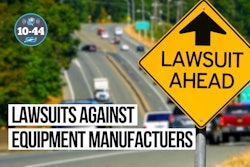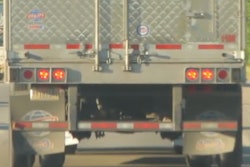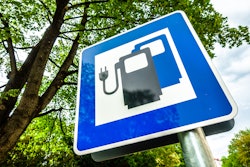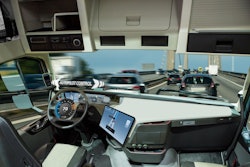Trucking news and briefs for Thursday, Oct. 10, 2024:
More groups challenge California’s ACF regulation
NTEA – The Work Truck Association and the Specialty Equipment Market Association (SEMA) have filed suit against the California Air Resources Board (CARB), seeking immediate declaratory and injunctive relief to stop electric vehicle mandates CARB intends to implement through its Advanced Clean Fleets (ACF) regulations.
This is just the latest in a string of lawsuits against CARB over the ACF rule. The California Trucking Association, AmFree Chamber and a number of states have also filed suit against CARB.
In announcing their filing Tuesday, the organizations contended CARB’s actions far exceed California’s constitutional and state statutory authority and will have a dire effect on an industry that historically has led the way toward cleaner, safer vehicles – particularly through alternative-fuel innovations, replacing older engine technologies with newer, cleaner versions, and converting older internal combustion engine (ICE) vehicles to new electric or hydrogen-powered vehicles.
CARB’s ACF regulation, if implemented, requires trucks in certain operations, such as drayage, or owned by larger fleets to be zero-emission on an accelerated timeline. It also sets a hard deadline on the manufacture and sale of diesel medium- and heavy-duty trucks in the state, eliminating diesels' sale there by 2036, just a dozen years from now. Vehicles covered by the regulation include everything from heavy-duty tractors with sleeper cabs to work trucks, pickup trucks, and light-duty package delivery vehicles.
[Related: CARB lacks sufficient EV truck incentives, frustrated operators claim]
This issue is currently under consideration by the U.S. Environmental Protection Agency (EPA), whose waiver is necessary for the state to proceed.
NTEA and SEMA are filing the lawsuit on behalf of their members who own and operate fleets of vehicles regulated by the ACF regulations, or manufacture, market, and sell specialty vehicles, trucks, and automotive aftermarket products that may become obsolete in California and other markets if CARB is allowed to proceed in decreeing an end to ICE vehicles.
In bringing this action, NTEA and SEMA seek a declaration and injunction, and any other appropriate relief, to redress injuries and prevent further unlawful actions by the defendants in issuing and enforcing the ACF regulations, the organizations said.
Neither NTEA nor SEMA are anti-EV; rather, the organizations said they are steadfast in their shared belief that a technology-neutral environment is the best way to achieve lower vehicle emissions. By declaring one technology as the preferred solution of government, California is kneecapping other potential solutions, regardless of their promise for delivering the results the state seeks, they added.
[Related: Trucking groups, fleets urge EPA to deny waiver for CARB's diesel ban]
Pitt Ohio relocates Ohio terminal to Michigan
Pitt Ohio (CCJ Top 250, No. 45) has relocated its Toledo, Ohio, terminal to a larger, renovated facility in Monroe, Michigan.
The completely renovated terminal building is nearly 129,000 square feet and includes a 12,760 square-foot office building and 160 dock doors, a gain of 108 from its previous location.
Also on the complex is a nearly 20,0000 square foot 7-bay vehicle maintenance building and a new fueling island and tank. In line with the company's commitment to sustainability, the renovations incorporated post-consumer recycled materials.
“We are excited to announce the relocation of our Toledo terminal to a larger, renovated facility in Monroe, Michigan,” said Brad Caven, Pitt Ohio’s Vice President of Operations. “This move, just 20 miles from our previous location, will significantly enhance our shipping capacity and better serve our customers in Toledo and Southwest Michigan. The new terminal not only meets Pitt Ohio’s high sustainability standards but also provides a fantastic work environment for our dedicated employees.”
The new address is 1800 Frenchtown Center Drive in Monroe, Michigan, just 20 miles from its previous location in Toledo.
KAG delivering Purina products with Nikola hydrogen fuel cell electric truck
Nestlé Purina PetCare, in collaboration with The Kenan Advantage Group (CCJ Top 250, No. 17) and Nikola Corporation, launched its first zero-tailpipe-emission delivery with the use of a hydrogen fuel cell electric truck this week.
On its inaugural journey, the truck is transporting Purina products, including Tidy Cats cat litter, between three California cities: Stockton, Maricopa and Modesto. This represents a small part of Purina's overall strategy to reduce greenhouse gas emissions.
"We are continuously identifying new opportunities within our business and through partnerships to help us meet our sustainability goals," said Travis Krous, Purina senior director of Supply Chain Operations. "This truck represents an exciting opportunity to test new technology and determine if it's feasible to scale."
Purina's manufacturing strategy promotes regional production and distribution, minimizing the number of long-distance trucks on the road. KAG will deliver Purina products using the Class 8 Nikola hydrogen fuel cell electric truck, which has a maximum range of up to 500 miles and can be refueled in 20 minutes or less, all while producing zero tailpipe emissions while driving.
"We're excited to transport products on our first hydrogen fuel cell truck while helping our valued customer and partner, Purina, drive its sustainability goals forward," said Tyler Coventry, executive vice president of KAG Food Products. "We're committed to implementing more sustainable practices within the supply chain by optimizing the use of energy-efficient technologies."












